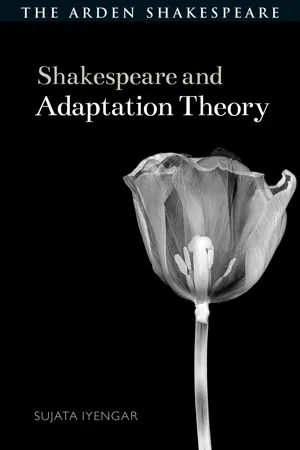
- 256 pages
- English
- ePUB (mobile friendly)
- Available on iOS & Android
Shakespeare and Adaptation Theory
About this book
Shakespeare and Adaptation Theory reconsiders, after 20 years of intense critical and creative activity, the theory and practice of adapting Shakespeare to different genres and media. Organized around clusters of key metaphors, the book explicates the principal theories informing the field of Shakespearean adaptation and surveys the growing field of case studies by Shakespeare scholars. Each chapter also looks anew at a specific Shakespeare play from the perspective of a prevailing set of theories and metaphors. Having identified the key critics responsible for developing these metaphors and for framing the discussion in this way, Iyengar moves on to analyze afresh the implications of these critical frames for adaptation studies as a whole and for particular Shakespeare plays. Focusing each chapter around a different play, the book contrasts comic, tragic, and tragicomic modes in Shakespeare's oeuvre and within the major genres of adaptation (e.g., film, stage-production, novel and digital media). Each chapter seasons its theoretical discussions with a lively sprinkling of allusions to Shakespeare - ranging from TikTok to tissue-boxes, from folios and fine arts to fan work. To conclude each chapter, the author provides a case-study of three or four significant and interesting adaptations from different genres or media. A glossary of terms compiled by Philip Gilreath and the author completes the book.
Frequently asked questions
- Essential is ideal for learners and professionals who enjoy exploring a wide range of subjects. Access the Essential Library with 800,000+ trusted titles and best-sellers across business, personal growth, and the humanities. Includes unlimited reading time and Standard Read Aloud voice.
- Complete: Perfect for advanced learners and researchers needing full, unrestricted access. Unlock 1.4M+ books across hundreds of subjects, including academic and specialized titles. The Complete Plan also includes advanced features like Premium Read Aloud and Research Assistant.
Please note we cannot support devices running on iOS 13 and Android 7 or earlier. Learn more about using the app.
Information
Table of contents
- Cover
- Half-Title Page
- Dedication
- Series page
- Title Page
- Contents
- Series Editor’s Preface
- List of Figures
- List of Tables
- Acknowledgements
- Note on Texts and Sources Used
- Introduction: Much ado about adaptation
- 1 Plants, off-shoots, genes: Rhizomes
- 2 Art, property, theft: Appropriation
- 3 Fidelity, families, ethics: Derivatives
- 4 Transfer, remediation, broadcast: Intermedia
- 5 Memes, networks, fans: Transformations
- 6 Relocation, translation, hybridization: Tradaptation
- 7 Accidents, remains, traces: Accommodations
- Glossary of selected terms
- Notes
- References
- Index
- Copyright